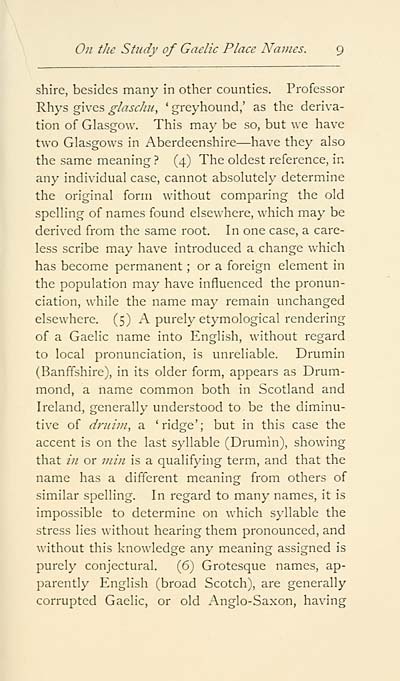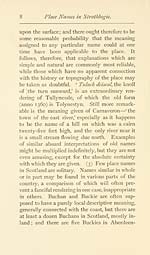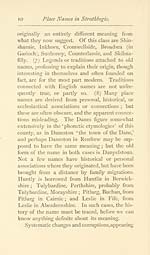Blair Collection > Place names in Strathbogie, with notes historical, antiquarian and descriptive
(29)
Download files
Complete book:
Individual page:
Thumbnail gallery: Grid view | List view

On the Stiidy of Gaelic Place Navies. g
shire, besides many in other counties. Professor
Rhys gives glascJni^ ' greyhound,' as the deriva-
tion of Glasgow. This may be so, but we have
two Glasgows in Aberdeenshire — have they also
the same meaning ? (4) The oldest reference, in
any individual case, cannot absolutely determine
the original form without comparing the old
spelling of names found elsewhere, which may be
derived from the same root. In one case, a care-
less scribe may have introduced a change which
has become permanent ; or a foreign element in
the population may have influenced the pronun-
ciation, while the name may remain unchanged
elsewhere. (5) A purely etymological rendering
of a Gaelic name into English, without regard
to local pronunciation, is unreliable. Drumin
(Banffshire), in its older form, appears as Drum-
mond, a name common both in Scotland and
Ireland, generally understood to be the diminu-
tive of druim, a 'ridge'; but in this case the
accent is on the last syllable (Drumin), showing
that /;/ or ;///;/ is a qualifying term, and that the
name has a different meaning from others of
similar spelling. In regard to many names, it is
impossible to determine on which syllable the
stress lies without hearing them pronounced, and
without this knowledge any meaning assigned is
purely conjectural. (6) Grotesque names, ap-
parently English (broad Scotch), are generally
corrupted Gaelic, or old Anglo-Saxon, having
shire, besides many in other counties. Professor
Rhys gives glascJni^ ' greyhound,' as the deriva-
tion of Glasgow. This may be so, but we have
two Glasgows in Aberdeenshire — have they also
the same meaning ? (4) The oldest reference, in
any individual case, cannot absolutely determine
the original form without comparing the old
spelling of names found elsewhere, which may be
derived from the same root. In one case, a care-
less scribe may have introduced a change which
has become permanent ; or a foreign element in
the population may have influenced the pronun-
ciation, while the name may remain unchanged
elsewhere. (5) A purely etymological rendering
of a Gaelic name into English, without regard
to local pronunciation, is unreliable. Drumin
(Banffshire), in its older form, appears as Drum-
mond, a name common both in Scotland and
Ireland, generally understood to be the diminu-
tive of druim, a 'ridge'; but in this case the
accent is on the last syllable (Drumin), showing
that /;/ or ;///;/ is a qualifying term, and that the
name has a different meaning from others of
similar spelling. In regard to many names, it is
impossible to determine on which syllable the
stress lies without hearing them pronounced, and
without this knowledge any meaning assigned is
purely conjectural. (6) Grotesque names, ap-
parently English (broad Scotch), are generally
corrupted Gaelic, or old Anglo-Saxon, having
Set display mode to: Large image | Transcription
Images and transcriptions on this page, including medium image downloads, may be used under the Creative Commons Attribution 4.0 International Licence unless otherwise stated. ![]()
| Early Gaelic Book Collections > Blair Collection > Place names in Strathbogie, with notes historical, antiquarian and descriptive > (29) |
|---|
| Permanent URL | https://digital.nls.uk/81166694 |
|---|
| Description | A selection of books from a collection of more than 500 titles, mostly on religious and literary topics. Also includes some material dealing with other Celtic languages and societies. Collection created towards the end of the 19th century by Lady Evelyn Stewart Murray. |
|---|
| Description | Selected items from five 'Special and Named Printed Collections'. Includes books in Gaelic and other Celtic languages, works about the Gaels, their languages, literature, culture and history. |
|---|

